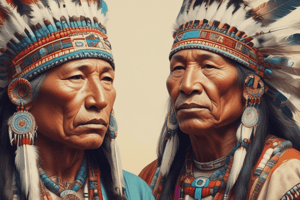Podcast
Questions and Answers
What does ILO Convention No. 169 (1989) emphasize regarding indigenous groups?
What does ILO Convention No. 169 (1989) emphasize regarding indigenous groups?
- Elimination of distinct cultures
- Individual rights over collective rights
- Cultural ties to land and autonomy (correct)
- Integration into mainstream society
The 1950s integration policies aimed to preserve indigenous cultures.
The 1950s integration policies aimed to preserve indigenous cultures.
False (B)
Who defined indigenous people as non-dominant groups preserving ancestral territories and identity?
Who defined indigenous people as non-dominant groups preserving ancestral territories and identity?
Martinez Cobo
The term used to describe policies that often create new forms of discrimination against indigenous people is __________.
The term used to describe policies that often create new forms of discrimination against indigenous people is __________.
What significant shift occurred in the 1980s-1990s regarding indigenous movements?
What significant shift occurred in the 1980s-1990s regarding indigenous movements?
Match the following authors with their contributions to the politics of indigeneity:
Match the following authors with their contributions to the politics of indigeneity:
Collective rights for indigenous peoples have been strengthened by state withdrawal during neoliberalism.
Collective rights for indigenous peoples have been strengthened by state withdrawal during neoliberalism.
Escobar & De la Cadena propose that development should be questioned as a __________ paradigm.
Escobar & De la Cadena propose that development should be questioned as a __________ paradigm.
What was a significant criticism of the Women in Development (WID) approach?
What was a significant criticism of the Women in Development (WID) approach?
The Gender and Development (GAD) approach emphasizes the importance of structural causes of women's subordination.
The Gender and Development (GAD) approach emphasizes the importance of structural causes of women's subordination.
What does the term 'feminisation of poverty' refer to?
What does the term 'feminisation of poverty' refer to?
The rights focus of __________ involves bodily autonomy, abortion, and contraception.
The rights focus of __________ involves bodily autonomy, abortion, and contraception.
Match the following concepts with their descriptions:
Match the following concepts with their descriptions:
Which of the following structures does GAD view as playing a significant role in shaping gender roles?
Which of the following structures does GAD view as playing a significant role in shaping gender roles?
Feminism and multiculturalism have completely removed colonial legacies.
Feminism and multiculturalism have completely removed colonial legacies.
Identify one intersectionality that gender intersects with as mentioned in the content.
Identify one intersectionality that gender intersects with as mentioned in the content.
Women often perform __________ care work, exacerbating social inequalities.
Women often perform __________ care work, exacerbating social inequalities.
What is one of the rights emphasized by Reproductive Justice?
What is one of the rights emphasized by Reproductive Justice?
What is one major reason Indigenous people in Colombia engage in coca farming?
What is one major reason Indigenous people in Colombia engage in coca farming?
Indigenous peoples are commonly depicted as both backward and harmonious in stereotypes.
Indigenous peoples are commonly depicted as both backward and harmonious in stereotypes.
What term refers to Indigenous rights recognized in the 2008 constitution of Ecuador?
What term refers to Indigenous rights recognized in the 2008 constitution of Ecuador?
The ________ program was designed for crop substitution for coca farming.
The ________ program was designed for crop substitution for coca farming.
Match the following terms with their descriptions:
Match the following terms with their descriptions:
Which of the following best characterizes the outcomes of the state investments during the modernization policies?
Which of the following best characterizes the outcomes of the state investments during the modernization policies?
Indigenous women in Ecuador benefited from the 1964 Agrarian Reform.
Indigenous women in Ecuador benefited from the 1964 Agrarian Reform.
What does the modernity versus tradition debate often oversimplify?
What does the modernity versus tradition debate often oversimplify?
The concept of ________ refers to institutionalized racial inequalities stemming from colonial histories.
The concept of ________ refers to institutionalized racial inequalities stemming from colonial histories.
Match the following examples of exclusion with their corresponding regions:
Match the following examples of exclusion with their corresponding regions:
What is one potential consequence of the constructed category of Indigeneity?
What is one potential consequence of the constructed category of Indigeneity?
Policy interventions have fully resolved power struggles over norms in Indigenous communities.
Policy interventions have fully resolved power struggles over norms in Indigenous communities.
Name one key question posed regarding policy towards Indigenous communities.
Name one key question posed regarding policy towards Indigenous communities.
Under modernisation policies, state investments mainly supported ________ over Indigenous populations.
Under modernisation policies, state investments mainly supported ________ over Indigenous populations.
Flashcards
ILO Convention No. 169
ILO Convention No. 169
International treaty outlining specific rights for indigenous groups, emphasizing self-identification, distinct culture, and ancestral ties to land. It was established in 1989 by the International Labour Organization (ILO).
Indigeneity
Indigeneity
A concept that centers on the distinct cultural traditions, ancestral lands, and collective identity of indigenous groups, emphasizing their survival and resilience as non-dominant societies.
Integration Policies
Integration Policies
Policies from the 1950s that aimed to assimilate indigenous groups into the dominant culture, often through forceful methods and overlooking their unique identities. This approach was enshrined in ILO Convention 107.
Multiculturalism
Multiculturalism
Signup and view all the flashcards
Place-based Territorial Projects
Place-based Territorial Projects
Signup and view all the flashcards
Critique of Multiculturalism in Post-development
Critique of Multiculturalism in Post-development
Signup and view all the flashcards
Identity and Authenticity in Indigenous Politics
Identity and Authenticity in Indigenous Politics
Signup and view all the flashcards
Hypermarginality
Hypermarginality
Signup and view all the flashcards
Gender
Gender
Signup and view all the flashcards
Gender and Development (GAD)
Gender and Development (GAD)
Signup and view all the flashcards
Unpaid Labour/Social Reproduction
Unpaid Labour/Social Reproduction
Signup and view all the flashcards
Critiques of WID
Critiques of WID
Signup and view all the flashcards
Weaponisation of Gender
Weaponisation of Gender
Signup and view all the flashcards
Reproductive Justice
Reproductive Justice
Signup and view all the flashcards
Gender Mainstreaming
Gender Mainstreaming
Signup and view all the flashcards
Chandra Mohanty's Critique
Chandra Mohanty's Critique
Signup and view all the flashcards
Tradition and Modernity: A False Dichotomy
Tradition and Modernity: A False Dichotomy
Signup and view all the flashcards
Stereotypes of Indigenous Peoples
Stereotypes of Indigenous Peoples
Signup and view all the flashcards
UN Working Group on Indigenous Populations
UN Working Group on Indigenous Populations
Signup and view all the flashcards
Modernisation Thesis
Modernisation Thesis
Signup and view all the flashcards
Normalisation Framework by Foucault
Normalisation Framework by Foucault
Signup and view all the flashcards
Intersectionality and Postcolonialism in Ecuador
Intersectionality and Postcolonialism in Ecuador
Signup and view all the flashcards
Gendered Labor Divisions
Gendered Labor Divisions
Signup and view all the flashcards
Huasipungo System
Huasipungo System
Signup and view all the flashcards
Single-Issue Development
Single-Issue Development
Signup and view all the flashcards
Gender and Development Programs
Gender and Development Programs
Signup and view all the flashcards
Colonial Legacies in Development Programs
Colonial Legacies in Development Programs
Signup and view all the flashcards
Diversity of Indigenous Peoples
Diversity of Indigenous Peoples
Signup and view all the flashcards
Indigenous Self-Determination
Indigenous Self-Determination
Signup and view all the flashcards
Indigenous Agency in Development
Indigenous Agency in Development
Signup and view all the flashcards
Study Notes
Defining Indigeneity
- ILO Convention No. 169 (1989) defines indigenous groups based on pre-colonial ancestry, distinct culture, and self-identification. This highlights potential for both empowering and limiting definitions.
- Martinez Cobo (1981) emphasizes indigenous people as non-dominant groups preserving ancestral territories and collective identity.
- Defining indigeneity poses challenges due to its reliance on historical, cultural, and subjective self-identification, influencing political and policy implications.
Integration to Multiculturalism
- 1950s integration policies (ILO 107) aimed to 'civilize' indigenous people, often with discriminatory outcomes.
- This is exemplified by policies like Brazil legally classifying indigenous people as minors unless integrated and Colombia exempting them from national laws under missionary guidance.
- A shift to pluralism and multiculturalism occurred in the 1980s-1990s with strong indigenous movements.
Key International Legislation
- ILO 169 (1989) rejects integration, promoting indigenous autonomy, pluralism, and cultural ties to land. It recognizes collective rights and natural resource access.
- 1990s reforms in Latin America strengthened constitutions to recognize indigenous autonomy, land rights, cultural practices, and justice systems. This strengthened collective rights but sometimes coincided with state withdrawal and neoliberalism.
Politics of Indigeneity
- Identity and authenticity are complex issues. Villaman & Hale highlight the limitations of an "authorized Indian" concept, while Ramos critiques the "hyperreal Indian" stereotype and Bessire discusses "hypermarginality."
- Recognition versus redistribution (Honneth & Fraser) shows ethnic politics often demanding recognition and difference, unlike other class-based considerations.
- New forms of discrimination against Indigenous people persist, sometimes through stereotypes ("good natives") and policies like Australia's cashless welfare card promoting paternalism.
Post-Development Thinking
- Escobar and De la Cadena advocate for place-based territorial projects respecting diverse worldviews, questioning development as a universal paradigm.
- Multiculturalism's limitations are also discussed, as inclusivity may often impose external development definitions.
Indigenous Communities in Colombia
- Indigenous participation in illicit economies (e.g., coca farming) is noted, creating paradoxical dilemmas regarding funding cultural traditions and exclusion from programs like crop substitution projects due to assumed victimhood.
- This demonstrates the tension between public perceptions and local realities.
Conclusions
- Indigeneity is a politically and legally constructed category with real-world impacts.
- Policies aiming for collectivity and equality can unintentionally disempower indigenous communities, obscuring the complexities of indigeneity.
- Essential questions about policy design—avoiding stereotypes and recognizing liberation under imposed categories—remain relevant.
Indigenous Peoples and Modernity
- Global indigenous populations are estimated at 370 million (UN). Indigenous groups are defined by concepts of seniority, non-domination, cultural distinction, and self-determination.
- Stereotypes persist regarding indigenous peoples being either backward/violent or simplistic/harmonious.
- Modernity/tradition dichotomies are a globally impacting and debated perspective on indigenous peoples.
Critique of Modernity/Tradition Dichotomy
- The dichotomy is often irrelevant because traditional cultures adapt and use modern elements and modern economies/industries hybridising traditional cultures.
- Change is often perceived as loss.
Colonial Present
- Ecuador's development discourse embodies colonial legacies which created social hierarchies persisting through modernization policies favoring urban populations over Indigenous counterparts.
- Indigenous women faced compounded oppression by gender, race, and class.
Gender and Development (GAD)
- Gender is socially constructed and hierarchical, favouring male identity. Gender intersects with other identities.
- GAD critiques WID, highlighting structural constraints as a contributing factor to gender inequality.
- Unpaid labour demonstrates women's disproportionate burden, while labor market segmentation leads to feminized poverty.
From WID to GAD
- WID (Women in Development) focused on women's roles in informal economies and entrepreneurship; GAD addressed structural causes of inequality and equitable gender relations.
- Reproductive Justice expands on reproductive rights to include the right to have children, parent safely, and address structural needs.
Decolonial Critiques of Gender and Development
- Critics like Mohanty challenge universalizing narratives and the idea of "Third World women" as solely victims.
- There are situations like the weaponisation of gender, evidenced by Laura Bush's rhetoric (2001) which reinforce colonial views on different cultures.
Studying That Suits You
Use AI to generate personalized quizzes and flashcards to suit your learning preferences.
Description
This quiz explores the definitions of indigeneity as outlined by key international conventions and scholars, examining the implications of these definitions on indigenous groups. It also investigates historical integration policies and the shift towards multiculturalism in the late 20th century, highlighting the struggles and achievements of indigenous movements.



